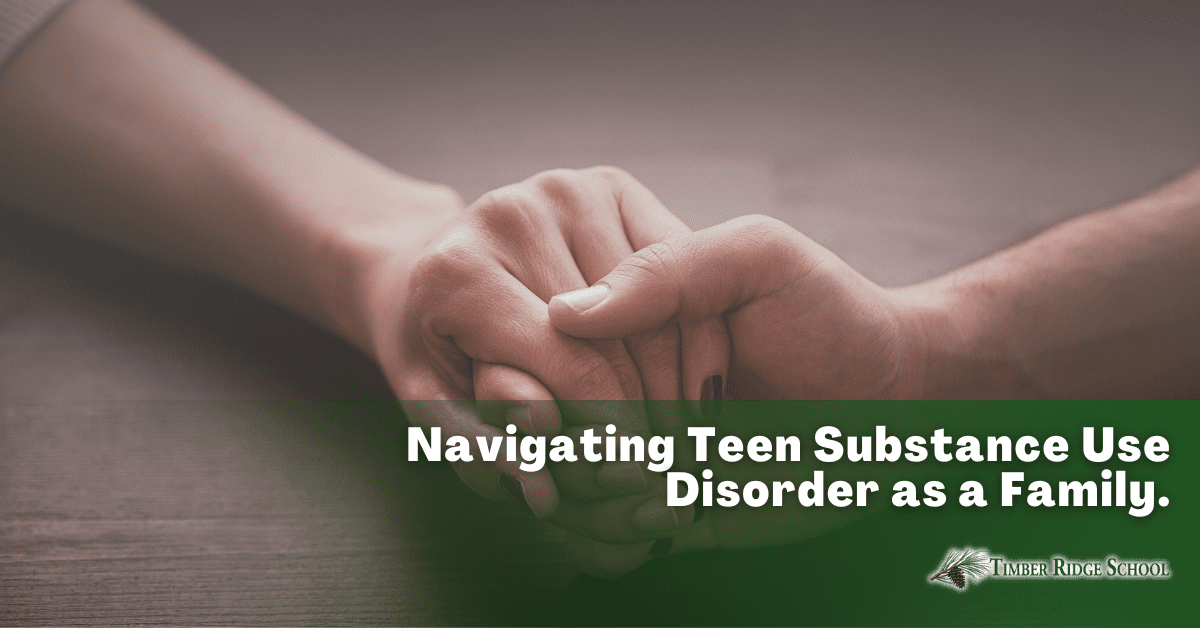You never think it could be your child, sibling, or loved one. Teen substance use disorder and addiction doesn’t just happen overnight — it’s gradual, marked by small changes that may seem insignificant until a life-changing crisis occurs and the difficult reality comes to light.
The impact of drug or alcohol misuse on a person’s life (particularly as a teenager) can be devastating, and dealing with the resulting behaviors and struggles of substance use disorder is one of the most challenging experiences that his loved ones can face, as well. Timber Ridge School handles these cases daily — we know that the road to recovery is not flat and linear.
Navigating addiction as a family is hardly straightforward, and cannot be captured in a compact list of steps. But with the right resources and a solid foundation to confront substance use disorder, there is hope and encouragement to help you move forward together.
Understand the Challenge of Teen Substance Use Disorder
Adolescence is a period of immense change, both physically and emotionally. For many young men, these changes can lead to experimentation with substances as they try to fit in with friends or cope with the pressures of growing up. Unfortunately, what may start as experimentation can quickly escalate to dependency.
The US Department of Health and Human Services referenced recent substance use data from SAMHSA, reminding us that substance misuse is more common than one realizes in their daily life, and one can start exhibiting signs of substance use disorder as early as 12 years old. Just a few key data points:
- “In 2023, 3.1% of people (8.9 million) misused opioids in the past year, which is similar to 2022 and 2021 (3.2% and 8.9 million, 3.4% and 9.4 million respectively).”
- “Among the 134.7 million people aged 12 or older who currently used alcohol in 2023, 61.4 million people (or 45.6%) had engaged in binge drinking in the past month.”
- “In 2023, 9.4% of people aged 12 or older vaped nicotine in the past month, up from 8.3% in 2022.”
As a family member, it’s essential to recognize the signs of substance use disorder early on. Changes in behavior, declining academic or work performance, secretive activities, and withdrawal from family life can all be red flags.
However, understanding that addiction is a complex and multifaceted issue is also crucial — it’s not simply a matter of willpower or a moral failing. Addiction often stems from underlying issues, such as mental health struggles, trauma, or other environmental factors.
Once you suspect or confirm that your teen loved one is struggling with substance use disorder, the first step is to seek professional help. Early intervention and professional involvement are key.
Support Your Teen Through the Process
As a family member, your role in your teen’s recovery journey is vital. Here are some steps you can take to support them:
- Educate Yourself: Avoid playing the “blame game” with your loved one’s addiction. Learn about the characteristics, patterns, and science of addiction and recovery to better understand what your teen is going through. This knowledge will help you provide informed support.
- Maintain Open Communication: Foster an environment where your teen feels safe to talk about their struggles without fear of judgment. Honest and compassionate communication is key to building trust.
- Set Boundaries: While it’s important to support your teen, it’s also crucial to set clear boundaries. Do not give them money, enabling them to buy more alcohol or drugs. Enforce curfew and monitor nightly activity. Consistent rules and expectations can provide the structure they need to stay on the path to recovery.
- Seek Support for Yourself: Dealing with a loved one’s addiction is emotionally taxing — especially if it’s your child. Consider joining a support group for families of addicts, where you can share experiences and gain strength from others facing similar challenges.
- Encourage Positive Activities: Help your teen find healthy outlets for their energy and emotions, such as sports, hobbies, or volunteering. Engaging in positive activities together can boost their self-esteem, enforce accountability and trust, and reduce the risk of relapse. Even routines like a family meal together can have a deeply grounding impact.
The Road to Recovery
Recovery from teen substance use disorder is not a linear process—there will be ups and downs along the way. However, with the right support and strong commitment to change, your teen can overcome their addiction and build a brighter future.
At Timber Ridge School, our substance use disorder program is not just about helping young men stop using drugs or alcohol — it focuses on healing the whole person. The program includes individual and group therapy sessions, where teens can explore the root causes of their addiction and develop healthy coping mechanisms. We offer a structured and nurturing environment that emphasizes the importance of entire family involvement in the recovery process.
Timber Ridge School offers specialized substance use disorder services tailored to the needs of young men. Our program is designed to address both the behavioral and emotional aspects of addiction, providing a comprehensive approach to recovery. For more information on Timber Ridge School’s substance use disorder services, click here.

